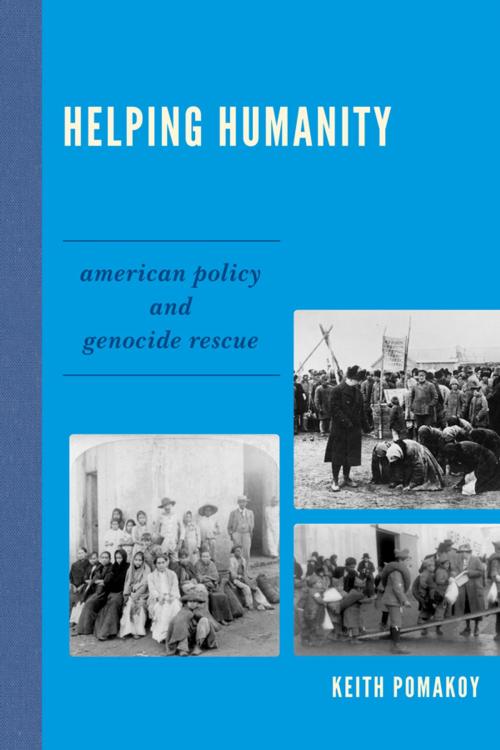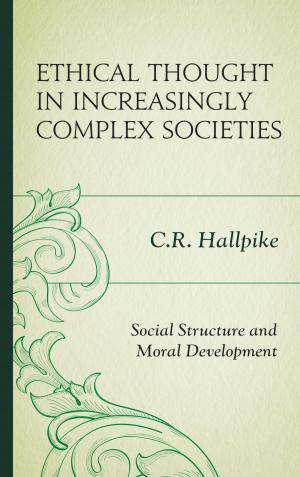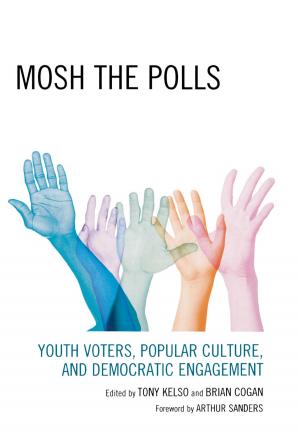Helping Humanity
American Policy and Genocide Rescue
Nonfiction, Social & Cultural Studies, Political Science, International, International Relations, History, Modern, 20th Century| Author: | Keith Pomakoy | ISBN: | 9780739169056 |
| Publisher: | Lexington Books | Publication: | March 4, 2011 |
| Imprint: | Lexington Books | Language: | English |
| Author: | Keith Pomakoy |
| ISBN: | 9780739169056 |
| Publisher: | Lexington Books |
| Publication: | March 4, 2011 |
| Imprint: | Lexington Books |
| Language: | English |
Helping Humanity: American Policy and Genocide Rescue explores American foreign policy reactions to genocide and state caused humanitarian crises. This book provides an examination of the nature of genocide and America's 19th century philanthropic efforts; it then offers case studies focused on the Cuban Insurrection, the Armenian Genocide, the Terror-Famine, World War II, and the Cambodian Genocide. It also includes a discussion of the difficulties encountered by would-be rescuers in the post-Cold War era. Pomakoy shows that the policies pursued by various presidents reflected a balance of policy considerations. Rarely did imperial or isolationist ambitions dominate American policy completely. Humanitarian concerns played an important, if rarely appreciated, role in foreign policy formulation, and represent a neglected dynamic in American history. Numerous rescue efforts developed as ordinary Americans joined with missionaries and diplomats to raise and distribute humanitarian aid. This peculiar blending of private and public resources grew apace with American wealth and power in the 19th and 20th centuries, and provided succor to those who could be reached. In Armenia this aid saved hundreds of thousands of lives. During World War II a similar campaign saved some of Hitler's victims from death. Sometimes American rescue efforts succeeded only because the use of force removed the underlying causes of the humanitarian crisis, as in Cuba in 1898, where an aid campaign did not succeed until America's military might ended the fighting on the island. Other American presidents ignored, or downplayed, humanitarian crises, especially when the realities of geography and power politics prevented effective rescue.
America has been roundly criticized for the absence of a genocide rescue policy. Helping Humanity revisits this discussion, arguing that American foreign policy reactions to genocide encompassed more activity than is usually recognized. Philanthropy, diplomatic pressure, war, and soft diploma
Helping Humanity: American Policy and Genocide Rescue explores American foreign policy reactions to genocide and state caused humanitarian crises. This book provides an examination of the nature of genocide and America's 19th century philanthropic efforts; it then offers case studies focused on the Cuban Insurrection, the Armenian Genocide, the Terror-Famine, World War II, and the Cambodian Genocide. It also includes a discussion of the difficulties encountered by would-be rescuers in the post-Cold War era. Pomakoy shows that the policies pursued by various presidents reflected a balance of policy considerations. Rarely did imperial or isolationist ambitions dominate American policy completely. Humanitarian concerns played an important, if rarely appreciated, role in foreign policy formulation, and represent a neglected dynamic in American history. Numerous rescue efforts developed as ordinary Americans joined with missionaries and diplomats to raise and distribute humanitarian aid. This peculiar blending of private and public resources grew apace with American wealth and power in the 19th and 20th centuries, and provided succor to those who could be reached. In Armenia this aid saved hundreds of thousands of lives. During World War II a similar campaign saved some of Hitler's victims from death. Sometimes American rescue efforts succeeded only because the use of force removed the underlying causes of the humanitarian crisis, as in Cuba in 1898, where an aid campaign did not succeed until America's military might ended the fighting on the island. Other American presidents ignored, or downplayed, humanitarian crises, especially when the realities of geography and power politics prevented effective rescue.
America has been roundly criticized for the absence of a genocide rescue policy. Helping Humanity revisits this discussion, arguing that American foreign policy reactions to genocide encompassed more activity than is usually recognized. Philanthropy, diplomatic pressure, war, and soft diploma















